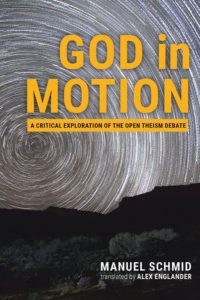God in Motion: A Critical Exploration of the Open Theism Debate. Manuel Schmid. Waco, Texas: Baylor University Press, 2021. 274pp. $54.99.
This excellent work by Swiss theologian Manuel Schmid covers the achievements and shortcomings of the debate over open theism in American evangelicalism. Open theism is the idea that (1) God is “open” to creatures in the sense that the prayers and actions of people affect what God decides to do, and (2) that the future is “open” (there are multiple possible futures) rather than “closed” (only one determinate set of events).
Chapter one sketches the history of the view along with core ideas comprising the model. The history includes the debate in North America as well as a very helpful survey of contemporary German-language works (primarily Roman Catholics) engaging open theism. Schmid identifies the thematic center of open theism in the belief that the essence of God is love. A loving God takes risks because love cannot be forced. Open theists apply this to issues important to them such as petitionary prayer, theodicy, and developing a theology that is deeply relational. Their goal is to provide an attractive alternative to the model in which God tightly controls all events and who is unaffected by the prayers and suffering of people.
Chapter two examines the debated biblical texts. Schmid first presents the three main types of biblical texts open theists use to support their case. These are passages that depict God as acquiring knowledge (learning), as being disappointed, and as changing the divine mind from what God had previously decided. The next two sections discuss the passages that the evangelical critics of open theism claim contradict the open view and how open theists seek to harmonize the discordant biblical texts. Schmid applauds open theists for highlighting, just as Fretheim has done, these ignored biblical texts and insisting that theology take them into account when formulating a doctrine of God. Schmid criticizes open theists for their attempts to harmonize contradictory biblical texts and failing to engage historical criticism.
The third chapter covers the accounts open theists use to explain why the biblical texts regarding changes in God are not taken as depicting the reality of the divine experience in the theological tradition. Open theists draw upon the “Hellenization thesis” according to which Greek philosophical concepts led many early Christian theologians to believe that God must be totally immutable and impassible and so they classified biblical texts attributing changes to God as anthropomorphic (false). Schmid surveys the historical and contemporary literature regarding the Hellenization thesis and concludes that the claims made by open theists fit with the general scholarly consensus that the early Christian thinkers made use of Greek philosophical ideas which influenced their reading of scripture but also rejected or modified some philosophical ideas via the Christian narrative. Much of the chapter discusses varied understandings of anthropomorphism. Schmid finds problematic the attempts of some open theists to classify biblical texts about divine changes as literal and texts about a divine body as figurative. He believes the open theists who classify all God-talk as anthropomorphic and largely metaphorical are on firmer ground.
Chapter four addresses some key attributes of God. Open theists begin with the centrality of divine love and so prefer to think of omniscience as unsurpassable wisdom, omnipotence as liberating power, and immutability as unshakable faithfulness. They affirm dynamic omniscience: God knows all the past and present as definite and the future as possibilities. They also believe God is temporal instead of timeless. Schmid traces these ideas in the work of Fretheim and quotes Brueggemann’s claim that these ideas should lead to a reformulation of our doctrine of God. About half the chapter deals with resonances regarding these understandings of the divine attributes in the works of Brunner, Barth, Moltmann, and Pannenberg. He concludes that open theists have not yet furnished a complete reformulation of the doctrine of God.
The final chapter uses Brueggemann to claim that the attempt by many classical theists and open theists to harmonize the contradictory depictions of God in the Bible is futile. Schmid notes that some open theists have begun to use a Christological hermeneutic to identify which biblical texts speak accurately of God.
Schmid concludes that despite several shortcomings, open theism provides significant insights for reforming the doctrine of God. Overall, the book is extremely well researched, fair in its criticisms, and provides helpful suggestions. The sections on German-speaking theologians who either engage open theism or whose ideas resonate with open theism, are particularly helpful.

